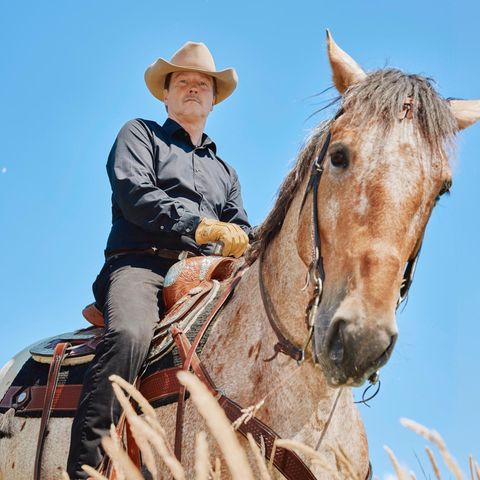Copy the current link
Nina Kapp used to often lie awake at night and think about her work. “I thought it was normal,” says the woman in her early 40s. In the financial industry, many colleagues work under stress. When things were no longer going well somewhere, Kapp stepped in: she rehabilitated German branches of Citibank in Bavaria, Baden-Württemberg and Saarland. She usually stayed for a year or a year and a half and got the branches on track until the numbers were correct again. Kapp says: “I realized that I can influence people so that they work more motivated and committed.” She was good at it, it could have continued like this forever until she retired. “That would have been okay,” says Kapp. Short break. Then she adds: “But just okay.”
This routine, this okay feeling, appears in many people, at the latest after their 40th birthday. The first career is over, and for some it is already their 15th or 20th company anniversary. Sure, you could just go for it now, a new project will definitely come up, your bosses and colleagues will thank you. On the other hand, isn’t retirement still a long way off? And should that really be all?
Kapp lacked new food for his brain; it had to come from somewhere else. At the same time, she began to delve deeply into psychotherapy, doing one training course after another, from trauma therapy to hypnosis, all alongside her full-time job. Until one day she decided: I would quit and become self-employed as a sleep therapist.
A career change requires good preparation
It is probably one of the most difficult questions in midlife: How much change in your career are you willing to take part in, and how much security can and do you want to forego? After the age of 40, most people are no longer as free and flexible as they were in their mid-20s. Often there are now children, a partner, the costs for an apartment or house continue, loans and insurance need to be serviced and a certain standard, with summer vacations or visits to restaurants , held. In addition, retirement planning is pressing, at least on the horizon. Obligations everywhere that don’t disappear just because you want a little variety.
Changes and changes are very possible, even after 15 or 20 years, even with a family and a home loan. They just need to be planned in more detail: make contacts, express interests, ask around – all of this needs to be prepared. Added to this is the collapse in personal finances: What reserves are there, how much money is still missing for the children’s education and for one’s own retirement provision? Yes, it all sounds tedious, but it can be worth it. This is what the men and women on the following pages show: Sandra Seitz-Atlama, who realized during the pandemic that she wanted to work more with people. The PR editor Markus Ludwig, who moved to Rome to work as an educator. Or Carina and Dirk Leven, who founded a riding school alongside their job.
Don’t complain anymore, just do it. This is the shorthand for what experts who deal with further training recommend. Sabine Votteler primarily advises managers on reorientation. “Everyone has financial worries,” she says. It is often diffuse existential fears. “For many people, personal finances are a black box,” says Votteler. It helps to list and check everything. “Many people are amazed at how much financial scope they have and where there is potential for savings.”
For sleep therapist Nina Kapp, the price was high: she gave up her well-paid management position after 20 years and had to pay 28,000 euros for training and registration as a alternative practitioner. And right at the start, a customer didn’t pay her a five-figure bill. “In moments like that I thought: What have I done?” says Kapp today. But as a banker she was prepared, she knew that not everything would go smoothly from the start – and she had a plan.
Many coaches who support new starts observe that people are often not as well prepared as Kapp. Although everyone philosophizes about lifelong learning and the big new beginning, many of today’s 40 to 50-year-olds no longer plan for a job change in their life plans. “This generation is in a quandary. The job market is just now moving towards multi-stage careers,” says Sebastian Kernbach, who, as an assistant professor at the University of St. Gallen, researches behavioral economics and life and career transitions. Today’s 50 to 60-year-olds are still sworn into the straight career path: training, career, retirement. Figures from the Allensbach Institute for Demoscopy show that things are not really different for younger people, those aged 30 to 59. 22 percent of them have been with the same employer for 20 years or longer. 31 percent are between 10 and 19 years old.
Many people lack courage
Author and labor market expert Margaret Heckel also confirms: “Few people dare to start something new professionally in the second half of their life.” She outlined the stories of such pioneers for her book “The Road to Unrest.” This also included Ebru Chaudhry. The 50-year-old started her career as a tax expert at the direct bank ING and has been working there as a programmer for four years now. A career change with the same employer – everyone benefits from this new start: Chaudhry was not on his own, but was able to start in a familiar environment, with support. ING, in turn, was able to retain a motivated employee and close a gap in an area where there is a shortage of staff.
Heckel believes that older career changers have valuable potential that has not yet been exploited. Especially in the current phase, when the economic downturn is combined with a shortage of skilled workers, companies should make an effort to enable older employees to reorient themselves.
The German vocational training system is too standardized, which makes “mobility between professions on the labor market” more difficult, writes the Bertelsmann Foundation. Data showed that voluntary changes are often associated with higher income and greater satisfaction.
So why do so few people still do it? “Many people are just too comfortable,” says Coach Votteler. “Changes are stressful and cause fear. Most people prefer to stay where they are and continue to suffer.” She notices this hesitation even among managers who are actually used to making decisions, advancing projects and finding solutions to complex problems. “But when it comes to setting your own course, it can be a tough process,” says Votteler.
And if there is the will to change? Some people take the leap straight away, from one job to the next. However, experienced coaches recommend feeling your way forward and answering a few questions first.
One is: What do you want?
Most people know what they no longer want, says Votteler. However, very few people would know what it should be instead.
Further questions include: What are your special skills? What do you like to do most? Where do you have the most experience? Where could your strengths be useful? From the intersection of these answers, a good idea for a new start usually emerges, Votteler knows from practical experience. But this task is not easy.
After the theory comes the first exercises: If you have a new job, an interesting profession or a promising company in mind, you should give it a try. Votteler advises that it is usually quite easy to contact people who work there via social networks such as Linkedin. And anyone who seeks a conversation at management level should not appear as a supplicant, but rather present their experiences as a valuable contribution to the company. “You should use different strategies when you’re over 40 than you did when you were younger,” she says. Applications for job advertisements were not included. “Anyone who writes 200 applications in five months and only receives rejections is doing something wrong.”
Four years after embarking on her second career, Nina Kapp is sleeping better – and not just because she is now a sleep therapist. The uncertainty has paid off; she now looks after a number of customers, gives workshops and produces a podcast. “We only have this one life,” she says. “And I still have so much to do.”
This article appears in “Capital” and in stern. Both magazines belong to RTL Deutschland.
Published in stern 01/2025
Source: Stern






